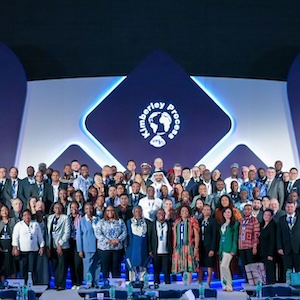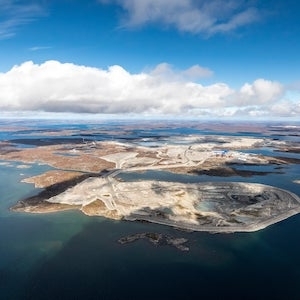
After 11 years, the Kimberley Process (KP) has lifted its embargo on diamonds from the Central African Republic (CAR).
The move marks something of a milestone, as no diamonds are now designated “conflict” by the certification scheme. When the decision was announced at the group’s annual plenary in Dubai on Nov. 15, a representative from South Africa blew a vuvuzela, and most in the room stood up and cheered, sources tell JCK.
Yet others caution the situation is hardly clear-cut. While CAR is currently operating under a peace agreement, an International Crisis Group report last month said that “rebel groups continue to fight the government in many rural areas, particularly around gold and diamond mining sites.”
Even so, the CAR government lobbied hard for the embargo to end. In a statement, the country’s minister of mines and geology, Rufin Benam Beltoungou, expressed “great joy and satisfaction” at the outcome.
Though the Kimberley Process Civil Society Coalition (KPCSC), comprised of frequent industry critics, endorsed the decision to lift the ban, some members believe it’s a sign of the KP’s failings, not its success.
The embargo did not “achieve its intended objectives,” says Hans Merket, a researcher and policy manager at International Peace Information Service, a KPSCS member.
“Instead of curbing the influence of rebels, criminals, and mercenaries profiting from diamond mining and trade, it largely fueled smuggling and illegal activity,” he tells JCK. “The embargo didn’t address the core issues in the CAR—rather it was a way to pull hands off them and pretend that it prevented conflict diamonds from entering the legal trade. Without addressing the root causes—massive fraud, corruption, and smuggling by criminal networks and mercenaries—I am afraid that the devastation will persist.”
A KPCSC statement sounded a similar note: “If the KP’s only tool in the one country that falls under its extremely narrow mandate has proven ineffective, then this should, hopefully and finally, convince everyone here that the KP has existential challenges. Let this be a clear and urgent signal that meaningful reform is not just needed but long overdue.”
Feriel Zerouki, president of the World Diamond Council, the industry’s representative before the KP, tells JCK that “after the war finished, the embargo was not helping the situation on the ground.”
She notes that the Kimberley Process’ recent review mission found that the Central African Republic was meeting the organization’s minimum requirements. “It’s the right step that will support artisanal communities by giving them legitimate routes to market,” she says.
An estimated 150,000 to 300,000 people work as artisanal diamond and gold miners in the country.
The Kimberley Process imposed the embargo on CAR in 2013. It was eased in 2016 and 2018, to allow certain regions to export.
At the Dubai meeting, the KP voted to let the United Arab Emirates act as custodian chair through 2025, as there was no other consensus choice. Belarus had put forward a candidacy for chair, but that was vetoed, given its close links to Russia. A Western country likely would have been vetoed by Russia’s allies.
The plenary did approve Thailand’s bid to serve as vice chair in 2025, which puts it on the path to serve as chair for 2026.
The KP also decided to allow co-chairs, which should open the doors for poorer nations to head the scheme.
“Countries with smaller GDPs can apply to be co-chair partners and lead the KP by sharing the hosting responsibility of intercessional and plenary by splitting the cost,” says Zerouki. “This gives us the opportunity of diverse and more inclusive leadership in the KP.”
In addition, the Kimberley Process committed to a long-delayed digitization of its records, which will “bring the KP into the 21st century,” Zerouki says.
(Photo courtesy of the Dubai Multi Commodities Centre)
- Subscribe to the JCK News Daily
- Subscribe to the JCK Special Report
- Follow JCK on Instagram: @jckmagazine
- Follow JCK on X: @jckmagazine
- Follow JCK on Facebook: @jckmagazine






